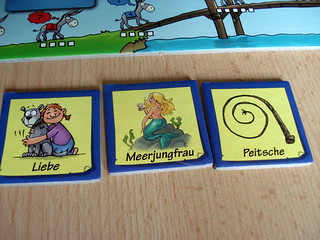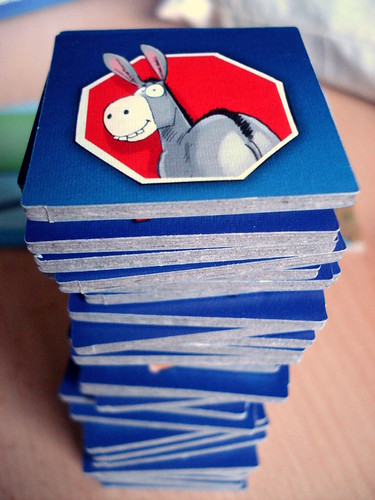| Strategy | Luck |
|---|---|
| Interaction | Components & Design |
| Complexity | Score |

Welcome to the linguistic research blog entry of the week. This week, we will discuss the German word Eselsbrücke (literally: donkey’s bridge) and our long and time-consuming research consisted of reading the German Wikipedia entry. So, apparently, donkeys are not at all fond of water, so if you are in the envyable position of owning a donkey, you will sometimes face problems getting them to cross even a small creek. Back in the days when donkey ownership was a more widespread phenomenon, people used to build eselsbrücken and would take a detour to go to them when they had to cross a creek with their donkey. The number of donkeys you see around German cities is surprisingly small nowadays, so the word eselsbrücke fell out of use – but us Germans, we’re very economical: rather than abandon a word just because we don’t need it anymore, we repurpose it. The modern meaning of eselsbrücke has nothing to do with donkeys, it’s a verbal memory aid, a mental detour you take to get your memory across the creek and remember something important. The famous English “Roy G. Biv” to remember the colours of the rainbow, for instance, would be called an eselsbrücke in German.
Enough etymology, what does any of this have to do with boardgames? Quite a lot, because the game titled Eselsbrücke is one of this year’s Spiel des Jahres nominees. It’s not, however, about building bridges across creeks in a swampy area in order to get your donkey to the other side in the fewest possible moves. Although that would be a fun theme to use, let me quickly write that down. No, Eselsbrücke is about the more modern use as a memory aid and is, rather unsurprisingly, a memory game. But don’t worry, it’s not much to remember. In a five player game it’s just 95 words …
That’s actually not as bad as it sounds, you’re not getting a list of 95 words to learn in the afternoon that you have to repeat at two in the morning. That would be rather contrary to the title. You get all those words in small chunks. Eselsbrücke is played in seven rounds. In the first two, each player only draws three chips from the giant bag-of-thick-paper-chips-with-words-and-cute-images. These words he tells to the other players and then comes up with an eselsbrücke to remember them – a sentence or short story involving the words is common, but if your memory aid for Bed – Orange – Barber is “Bob”, that might actually stick in people’s memories.
And that’s exactly what you want it to do, because starting with round three, after you create a new eselsbrücke for the round (consisting of four words now, but one word more will not make it harder, right?), the other players have to remember what you said in the rounds before. You pick the earliest stack of chips you still have and hand them out to the players to your left, one each. They may look at the one they get to spur their memory, then they have to name another word from the same set. If they can, they receive that word chip as a point counter, then it’s the next player’s turn. If they cannot, it’s still the next player’s turn, and they lose some of their points – the later in the game it is, the more. Get the last set wrong and you lose seven points, that’s quite devastating. With more than three players, not everyone gets a chance to guess on every set, but in the end everyone will have the same chances to score points. Of course, you only remember the words that you don’t get a turn to name and forget all that concern you. Worry not, that’s normal and happens to everyone.

What’s in it for you? Why should you come up with a good eselsbrücke if they only help your opponents score? That would be a silly concept, of course you win something as well: if no mistakes were made remembering your words, you receive a stop sign. Stop signs count points just like word chips, but if you have to discard points later they also stop the discarding. And that’s why you want a good eselsbrücke that everyone remembers.
In rounds six and seven, you don’t add new words any more, just try to remember the old ones, and when they are all gone, the game ends. For a memory game, Eselsbrücke is very entertaining – a long way up from the traditional turn to cards and see if they are alike memory games. But it is still a pure memory game, remembering things is not part of a bigger picture here, it’s all there is. You don’t play with strategy, you don’t even depend much on luck, you just remember things. Coming up with eselsbrücken is admittedly quite entertaining, especially when you draw Zeus – Pirate – Dungheap – Ghost – Nothing or something absurd like that. Have fun coming up with a mnemonic for that. But that’s, at least to me, not enough for the Spiel des Jahres. A good memory game, certainly, but not my Spiel des Jahres.
Now, to be fair, the recommended age for Eselsbrücke is eight and up and by the choice of words and the visual design, I think it’s safe to say that’s the target audience, not adult gamers. Maybe that’s my main gripe against Eselsbrücke as Spiel des Jahres: I could see it in Kinderspiel des Jahres with a real chance at winning – especially since I suspect it could be played with six year olds without trouble. Nevertheless, I’ll still happily play Eselsbrücke again just for the fun of it, and because as a memory game it is actually quite challenging.








